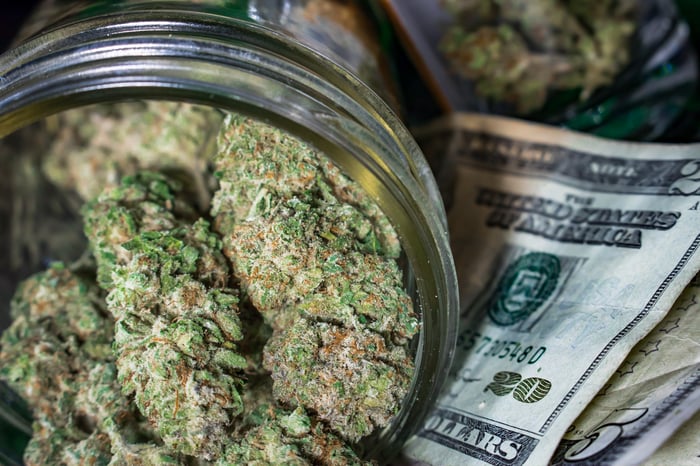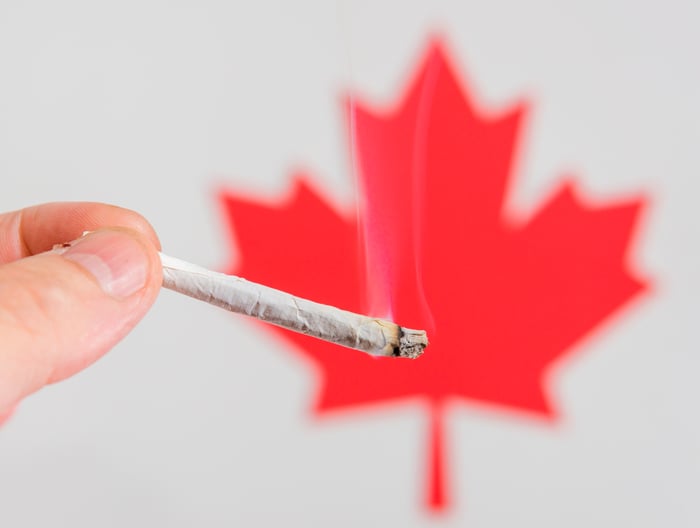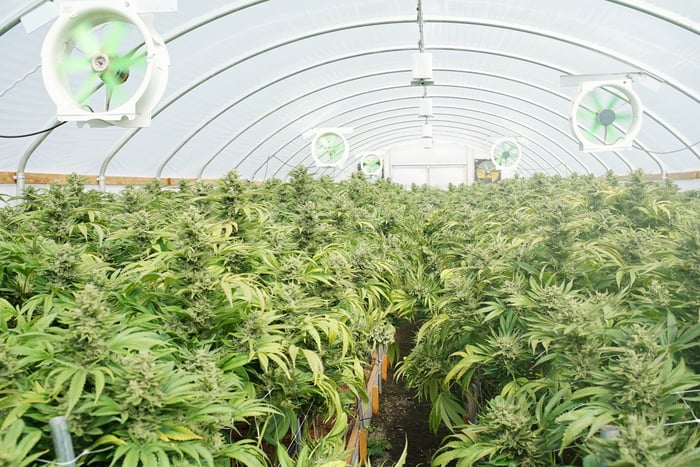The U.S. marijuana industry has seen incredible growth for the past couple of years. Last year alone, residents in four states voted to legalize recreational marijuana, doubling the number of states that allow the sale of adult-use pot, while five new states legalized medical cannabis (two of which did so entirely through the legislative process).
According to cannabis research firm ArcView, North American sales of cannabis grew by 34% in 2016 to $6.9 billion, though this still pales in comparison to the estimated $46.4 billion in illicit marijuana sales conducted on the black market.

Image source: Getty Images.
In legal states, the sales growth is too big to ignore. After generating $996.2 million in sales in 2015, along with approximately $135 million in tax and licensing revenue, Colorado's legal pot sales topped $1.3 billion in 2016, with tax and licensing revenue approaching $200 million. About two-thirds of Colorado's legal marijuana revenue came from the recreational side of the equation.
Washington takes the wind out of marijuana's sails
Yet for all of the momentum behind the U.S. marijuana industry, the federal government stands in the way of its success. On Capitol Hill, marijuana is still a Schedule 1 substance, meaning it's illegal and has no medically beneficial qualities. With this designation, pot-based companies face a number of challenges, such as the inability to take normal business tax deductions and the difficultly accessing basic banking services, like checking accounts. Being listed as a Schedule 1 drug also makes it exceptionally difficult for researchers to run much-needed clinical trials on cannabis that lawmakers have effectively demanded before they'd consider any type of rescheduling or de-scheduling of the drug.
Making matters even worse, White House press secretary Sean Spicer in February commented that the Trump administration would be changing course from the extremely lax policies of the Obama administration with regard to its hands-off agenda on state-level regulation. Though Trump has remained fully supportive of medical cannabis, and it doesn't appear as if the federal government will halt the ability of states to legalize medical marijuana, Spicer has intimated that tougher enforcement of federal laws with regard to recreational pot could be on the way. The appointment of ardent marijuana opponent Jeff Sessions as U.S. attorney general only adds fuel to the fire.
In other words, the U.S. marijuana market is sort of stuck in a proverbial limbo.

Image source: Getty Images.
This maple leaf could turn green in July 2018
However, according to senior Canadian government officials speaking on the condition of anonymity, Prime Minister Justin Trudeau and his progressive government are aiming to pass a countrywide legalization of recreational marijuana soon, such that by July 1, 2018, it would be legal for adults to smoke pot.
This news shouldn't come as a complete shock given that Trudeau has campaigned for the legalization of marijuana in the past. The question marks had always been whether Trudeau had the support of the Canadian government, and what the final bill would look like.
Per the various sources reporting on the matter, adults ages 21 and up would be allowed to buy recreational cannabis, users would be allowed to possess up to 30 grams (more than one ounce), and households could grow up to four plants at a time. Though some pundits have suggested a higher minimum age limit since brain development continues until age 25, the marijuana task force, which is offering advice to the Canadian government, believes a higher minimum age requirement would preserve black market sales.
The marijuana task force also suggested that marijuana strains should be taxed based on their potency. Thus, higher potency strains should come with a higher tax rate than weaker strains.
Lastly, the task force recommends that recreational marijuana not be sold in the same locations as tobacco and/or alcohol. Therefore, cannabis lounges could be set up in Canada, but they would have to be alcohol-free establishments.

Image source: Getty Images.
Opportunity up north
While there's still no guarantee that Canada will pass legislation to legalize recreational marijuana, this latest news suggests the highest confidence in doing so in months. Should Canada pass a bill legalizing recreational pot, it's not out of the question that we could see a "green rush" out of the U.S. and into Canada by some marijuana businesses.
Though the U.S. is believed to have a substantially larger market for recreational marijuana, two already established companies in Canada could stand to benefit: Canopy Growth Corp. (CGC 20.65%) and Aphria (NASDAQOTH: APHQF). Both Canopy Growth and Aphria are producers of marijuana in Canada for medical purposes. They both sell a good chunk of their production online. Assuming Canada regulates its cannabis industry in a similar fashion to Colorado, Washington, and Oregon -- by issuing licenses -- there's no reason why Canopy Growth and Aphria couldn't add recreational cannabis to complement their existing medical businesses.
What would make this all too perfect for Canopy Growth and Aphria is that both companies have been recently expanding their growing capacity. Canopy Growth recently acquired Mettrum Health, boosting its capacity to six licensed facilities and 665,000 square feet, while Aphria has been increasing its growing space organically through expansion phases. It recently implemented part three of its expansion, which will ultimately triple its production capacity. Not surprisingly, these also happen to be the only two marijuana stocks that are currently generating positive earnings before interest, taxes, depreciation, and amortization, implying a sustainable business model.
While this Fool remains highly skeptical of marijuana stocks because of their high valuations relative to their minimal current profit potential, these two remain the ones to watch for the time being.





